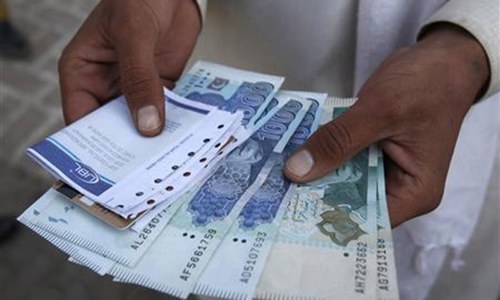Trading was halted at the Pakistan Stock Exchange (PSX) on Friday after the benchmark KSE-100 index soared almost 1,500 points — a rise of 5 per cent — a day after the State Bank of Pakistan (SBP) slashed the country's policy rate by 200 points in a surprise move.
The market opened at 10:15am, with the benchmark index almost 1,000 points in the green. By 10:50am, when trading was halted after activation of the circuit breaker, the index was trading at 32,888 – a rise of 1,559 points or 5pc.
After trading resumed at 11:55am, the market continued to increase its gains for another 20 minutes, peaking for the day at 33,257 points (up 6.15pc or 1,928 points) around 12:15pm, after which it shed some 430 points to close at 32,827 – up 4.8pc or 1,498 points.

Muhammad Faizan Munshy, Head of Foreign Sales at Next Capital Limited, said domestic equities inched up the highest since 2009 after the central bank cut its key policy rate.
"The International Monetary Fund's (IMF) approval to provide a rapid facility fund to Pakistan of almost $1.4 billion also fuelled bullish sentiments," he said.
He added that the rupee gained almost two per cent as international donors deferred loan payments. "This also proved to be beneficial for the stock market," he said.
A day earlier, SBP in an emergency meeting of the monetary policy committee had reduced the country's policy rate by 200 points to nine per cent for the third time in less than a month.
The decision was taken "in light of the reduction in growth and inflation" projections released by the International Monetary Fund (IMF) earlier this week, a statement released by the SBP had said.
The statement had added the committee "remains ready to take whatever further actions become necessary in response to the evolving economic impact of the coronavirus".
The committee had noted the impact of the coronavirus pandemic on the global economy, which it said was "expected to enter into the sharpest downturn since the Great Depression".
"The MPC was of the view that this action [cutting policy rate] would cushion the impact of the coronavirus shock on growth and employment, including by easing borrowing costs and the debt service burden of households and firms, while also maintaining financial stability," the statement had read.














































